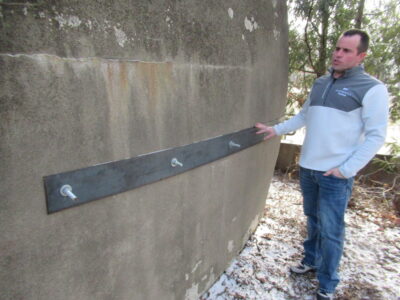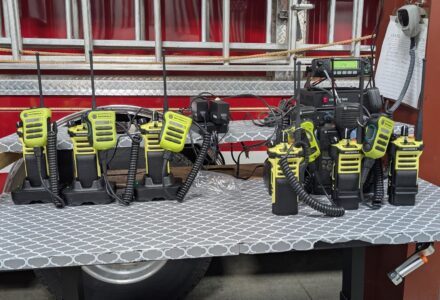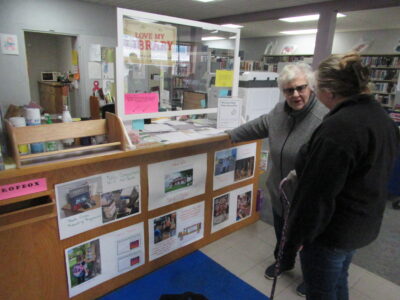Sharing accessibility to the outdoors
Action Foundation plans program to lend mobility equipment to people, organizations

Photo by Deb Gau Examples of a trailer and outdoor mobility equipment for the Action Foundation’s Tow & Go program were on display during a luncheon at the Red Baron Arena earlier this week.
MARSHALL — A local nonprofit wants to expand people’s opportunities to enjoy the outdoors.
One way the Action Foundation can help is by making adaptive equipment more available to area residents, foundation executive director Audra Klinkner said.
“The most important work is starting here at home in Marshall,” Klinkner told an audience at the Red Baron Arena on Wednesday.
This week, members of the Action Foundation were spreading the word about a pilot program that would lend mobility equipment, from Action Trackchairs to handcycles, to individuals or organizations.
“It would be like a library lending system, almost,” Klinkner said. “We want to make it as smooth and seamless as possible.”
The Action Foundation, which was founded by Tim and Donna Swenson, is dedicated to making sure people with mobility challenges can experience the outdoors. On Wednesday, the foundation brought together people like area business leaders and representatives of the city of Marshall at an event at the Red Baron Arena.
The event highlighted Action Foundation’s work to improve access at state and national parks, and ideas like the Tow & Go program.
Klinkner said the idea for the Tow & Go program would be to make mobility equipment like Trackchairs, offroad wheelchairs like ZoomAbility and GRIT Freedom chairs, and handcycles available for area residents and organizations to reserve.
For example, Tow & Go could provide mobility equipment for an event like a cancer survivor walk, Klinkner said.
“We’d deliver and pick them up for the event, making access as seamless as possible,” she said. “Similarly, someone recovering from an accident might borrow a Trackchair for a week or two to go hunting, or a family bringing a loved one to town might borrow equipment for a day or two to explore together.”
People would be able to request the equipment they need through Action Foundation’s website.
Klinkner said the Action Foundation plans to roll out the Tow & Go program in phases. The first phase will work with Avera Marshall providers to help make the program available to patients, she said.
“This first phase is really about working out any early kinks, figuring out what works, what doesn’t, and fine-tuning the process,” Klinkner said. “One of the biggest priorities right now is making sure doctors and providers are educated, not just on the equipment in the trailer, but on how it can be used as part of therapy, how it can benefit their patients long-term, and how they can help connect those patients to the program.”
After Phase 1, the Tow & Go program would be opened up to the wider community, Klinkner said.
Klinkner said the plan for the Tow & Go program was for it to be fully donor-funded. The Action Foundation was also applying for grant funding from the Avera Foundation, she said.
Klinkner said the idea for the program grew out of dinner-table conversations about how people who use mobility equipment could access outdoor equipment more easily. Klinkner’s husband Derek Klinkner lives with a spinal cord injury, and coaches wheelchair basketball at Southwest Minnesota State University.
“I always joke that the entire SMSU wheelchair basketball team are basically my kids too. So, when I started thinking about how to make it easier for them to access this kind of equipment and just enjoy life, this vision came to mind,” she said. Klinkner said the program also gained momentum from discussions with National Park Service leaders.
As the Tow & Grow program rolls out, more information will be updated on the Action Foundation’s website, Klinkner said. People interested in supporting the program could also contact the foundation, she said.
Klinkner said the Action Foundation was also working to collaborate with state and national parks to improve accessibility.
“Over the past year, we’ve engaged directly with leaders from the National Park Service, the National Park Foundation, and various state park systems, all of whom have expressed a strong desire to improve accessibility but need partners who can offer a common-sense, practical solution,” she said. Klinkner said the Action Foundation was contributing to the development of trackchair programs and accessible hiking guides at parks, in partnership with GRIT Freedom Chair.
“We’ve also been invited to join a national coalition on outdoor accessibility led by REI,” she said.



